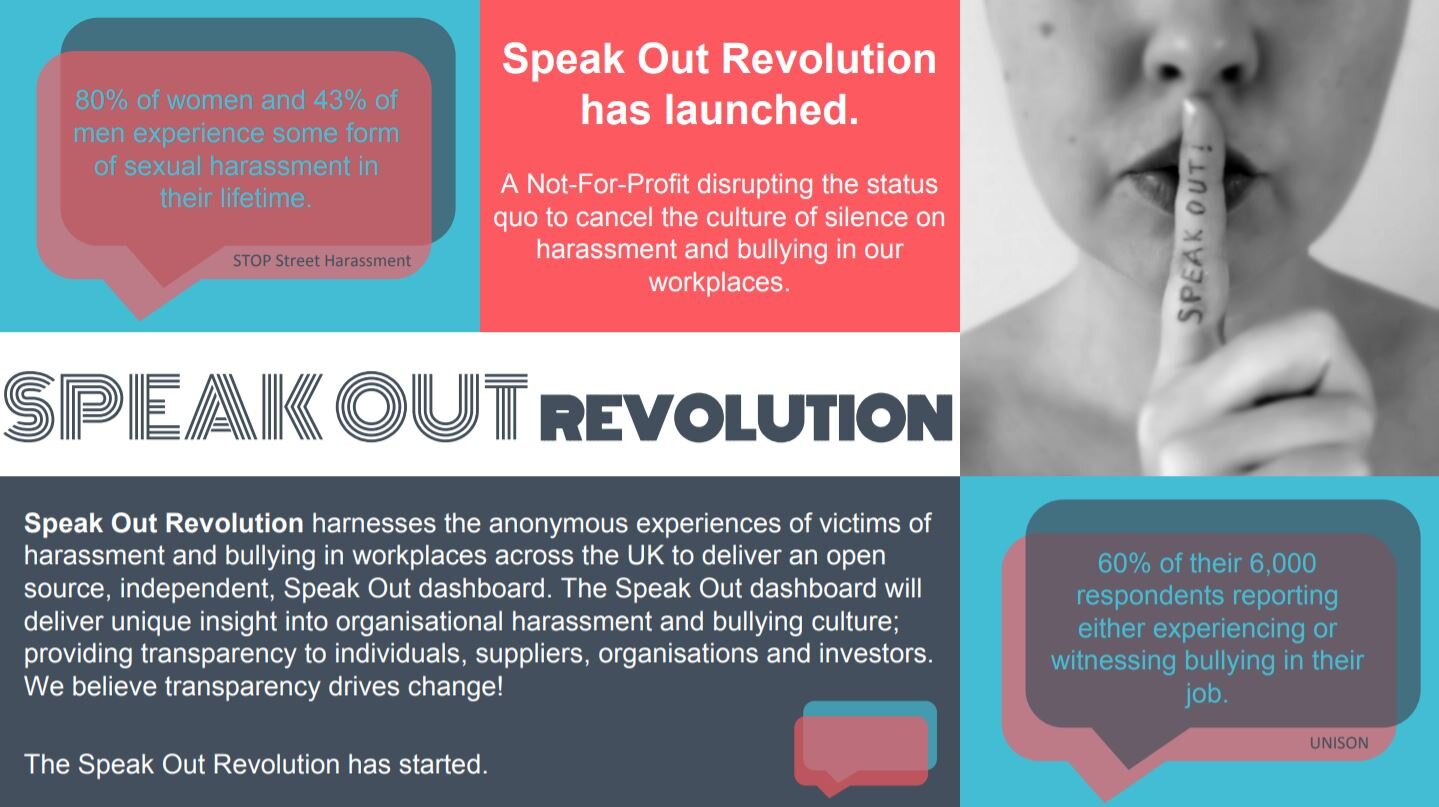The silent killer of truly diverse and inclusive workplaces
Can we create truly inclusive working environments without addressing how we handle harassment and bullying complaints in the workplace? A recent anonymous survey highlighted that it is TWICE as likely that speaking up and reporting harassment and bullying to your organisation will make your situation worse, not better.
In this article, I share my views on the accepted culture of silence around harassment and bullying, the practices which perpetuate the problem and why we need a Speak Out Revolution if we’re committed to achieving fair and safe working environments for everyone.
The accepted culture of silence
I grew up with 2 older brothers, studied physics and engineering at university, served as a reservist in the RAF and started my consulting career in the defence sector - so it’s fair for me to say that I have spent the majority of my life in the minority (when it comes to my gender) - and it has offered me insight into, and experience of, the challenges faced by people working in fields where they are underrepresented. This has really influenced my voluntary work to drive change through raising awareness, removing barriers and championing people to pursue their chosen fields.
What I have come to realise through this work is that privilege shields us from the unseen barriers; increasingly common within my professional network are reports of harassment and bullying which when raised as a complaint is dismissed, diminished or ignored in favour of not challenging the status quo.
I have had the privilege of hearing individual experiences of harassment and bullying, and have learnt it is not just underrepresented groups that are impacted by these behaviours in the workplace. They can affect everyone, in all groups and, at every level of our organisations.
What is fascinating to me, with the current focus on equality, diversity and inclusion within our workplaces is why harassment and bullying is still considered a taboo subject. I believe that we cannot achieve equality of opportunity in the workplace while we continue to support the practices which act to silence those who can help us understand and solve the cultural problem.
And it got me wondering… When unresolved harassment and bullying doesn’t benefit victims, organisations, partners or investors. What drives this toxic culture of silence?
Speaking up and self preservation are mutually exclusive
I concluded: Self preservation. Here’s why…
Speaking up is exhausting
The journey a victim of harassment and bullying must undertake to attempt to improve their situation is incredibly taxing both emotionally and (depending on how far they choose to escalate it) financially.
Alongside fulfilling your everyday role, individuals who are victims of this behaviour must keep up appearances to mitigate any reputational damage, methodically document the harassment and bullying experiences as they unfold and manage the likely interpersonal conflict and associated stresses that a complaint will bring.
Oftentimes, the mental and physical price of pursuing a complaint to resolution is too high.
Speaking up does not work
This burden might be overlooked if individuals were confident that speaking up would resolve their hostile working conditions.
Unfortunately, an anonymous survey undertaken within an organisation experiencing alleged widespread issues of harassment and bullying highlights how it is TWICE as likely that a victim's experience becomes worse, than is fully resolved, by reporting to their organisation.
Speaking up is ‘career limiting’
Speaking up acts to reinforce the incorrect perception that the victim is the problem.
Victims, unlike alleged perpetrators, were routinely transferred teams as a consequence of their complaint often negatively impacting their reputation and career progression.
Victims receive major backlash from colleagues in their working proximity as a consequence of their complaint (referred to as victimisation). Often this backlash is worse than the experience which warranted the initial complaint.
66% of people will choose to not report harassment, bullying and victimisation - Anonymous survey
So it’s unsurprising to me, given the systems and practices in place, that so few people report harassment and bullying - there is a massive disincentive to do so.
It seems we have created the perfect environment for harassment and bullying to persist; we have effectively silenced those who can help expose the endemic issues which act to oppose cultivation of truly diverse and inclusive workplaces.
The Speak Out revolution
I believe that unreported and unresolved harassment and bullying complaints are one of the major unseen barriers to advancement for individuals in the workplace and similarly for organisations looking to truly achieve diverse and inclusive working environments.
I’m determined to impact change; and provide a voice to those who have been, and will be, silenced for the benefit of those that follow.
Speak Out Revolution is a Not-For-Profit disrupting the status quo to cancel the culture of silence on harassment and bullying in our workplaces.
Our VISION is a world where every employer provides a fair and safe working environment for all.
Our MISSION is to cancel the culture of silence around harassment and bullying in our workplaces. We will empower the disempowered to speak out, challenge the status quo and advocate for organisational change.
We will harness the anonymous experiences of victims of harassment and bullying in workplaces across the UK using a nationwide survey to deliver an open source, independent, Speak Out dashboard.
The Speak Out dashboard will deliver unique insight into organisational harassment and bullying culture; providing transparency to individuals, organisations, partners and investors.
We believe that equality can’t wait, and transparency drives change...
Join the Speak Out Revolution. Complete The Speak Out Survey today!
Thanks for reading!



